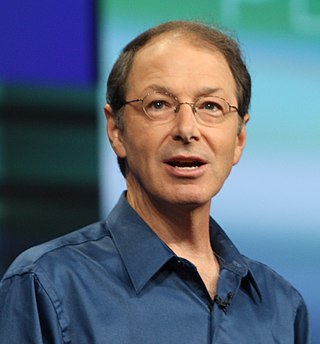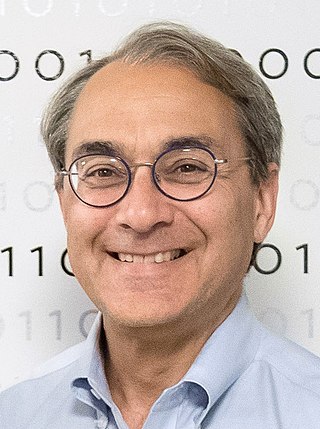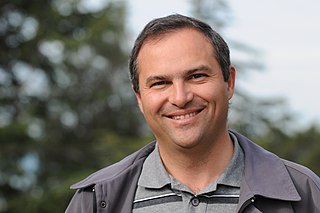Coda is a distributed file system developed as a research project at Carnegie Mellon University since 1987 under the direction of Mahadev Satyanarayanan. It descended directly from an older version of Andrew File System (AFS-2) and offers many similar features. The InterMezzo file system was inspired by Coda.

The School of Computer Science (SCS) at Carnegie Mellon University in Pittsburgh, Pennsylvania, US is a school for computer science established in 1988. It has been consistently ranked among the top computer science programs over the decades. As of 2022 U.S. News & World Report ranks the graduate program as tied for second with Stanford University and University of California, Berkeley. It is ranked second in the United States on Computer Science Open Rankings, which combines scores from multiple independent rankings.
The Andrew File System (AFS) is a distributed file system which uses a set of trusted servers to present a homogeneous, location-transparent file name space to all the client workstations. It was developed by Carnegie Mellon University as part of the Andrew Project. Originally named "Vice", "Andrew" refers to Andrew Carnegie and Andrew Mellon. Its primary use is in distributed computing.
The Andrew Project was a distributed computing environment developed at Carnegie Mellon University beginning in 1982. It was an ambitious project for its time and resulted in an unprecedentedly vast and accessible university computing infrastructure. The project was named after Andrew Carnegie and Andrew Mellon, the founders of the institutions that eventually became Carnegie Mellon University.

Carnegie Mellon Silicon Valley is a degree-granting branch campus of Carnegie Mellon University located in the heart of Silicon Valley in Mountain View, California. It was established in 2002 at the NASA Ames Research Center in Moffett Field.

Richard Farris Rashid is the founder of Microsoft Research, which he created in 1991. Between 1991 and 2013, as its chief research officer and director, he oversaw the worldwide operations for Microsoft Research which grew to encompass more than 850 researchers and a dozen labs around the world.

Alfred Zalmon Spector is an American computer scientist and research manager. He is a visiting scholar in the MIT EECS Department and was previously CTO of Two Sigma Investments. Before that, he was Vice President of Research and Special Initiatives at Google.

Randal E. Bryant is an American computer scientist and academic noted for his research on formally verifying digital hardware and software. Bryant has been a faculty member at Carnegie Mellon University since 1984. He served as the Dean of the School of Computer Science (SCS) at Carnegie Mellon from 2004 to 2014. Dr. Bryant retired and became a Founders University Professor Emeritus on June 30, 2020.

Mary Shaw is an American software engineer, and the Alan J. Perlis Professor of Computer Science in the School of Computer Science at Carnegie Mellon University, known for her work in the field of software architecture.

Manuela Maria Veloso is the Head of J.P. Morgan AI Research & Herbert A. Simon University Professor Emeritus in the School of Computer Science at Carnegie Mellon University, where she was previously Head of the Machine Learning Department. She served as president of Association for the Advancement of Artificial Intelligence (AAAI) until 2014, and the co-founder and a Past President of the RoboCup Federation. She is a fellow of AAAI, Institute of Electrical and Electronics Engineers (IEEE), American Association for the Advancement of Science (AAAS), and Association for Computing Machinery (ACM). She is an international expert in artificial intelligence and robotics.

George Ciprian Necula is a Romanian computer scientist, engineer at Google, and former professor at the University of California, Berkeley who does research in the area of programming languages and software engineering, with a particular focus on software verification and formal methods. He is best known for his Ph.D. thesis work first describing proof-carrying code, a work that received the 2007 SIGPLAN Most Influential POPL Paper Award.

Ion Stoica is a Romanian–American computer scientist specializing in distributed systems, cloud computing and computer networking. He is a professor of computer science at the University of California, Berkeley and co-director of AMPLab. He co-founded Conviva and Databricks with other original developers of Apache Spark.

Anthony "Tony" I. Wasserman, is an American computer scientist. He is a member of the board of directors of the Open Source Initiative, was a professor of the Practice in Software Management at Carnegie Mellon Silicon Valley, and is executive director of the CMU Center for Open Source Investigation. He has been a SkyDeck accelerator program advisor at University of California, Berkeley since 2021.
Michael L. Kazar is an American engineer and technology executive.
Bernd Bruegge is a German computer scientist, full professor at the Technische Universität München (TUM) and the head of the Chair for Applied Software Engineering. He is also an adjunct associate professor at Carnegie Mellon University (CMU) in Pittsburgh.
A cloudlet is a mobility-enhanced small-scale cloud datacenter that is located at the edge of the Internet. The main purpose of the cloudlet is supporting resource-intensive and interactive mobile applications by providing powerful computing resources to mobile devices with lower latency. It is a new architectural element that extends today's cloud computing infrastructure. It represents the middle tier of a 3-tier hierarchy: mobile device - cloudlet - cloud. A cloudlet can be viewed as a data center in a box whose goal is to bring the cloud closer. The cloudlet term was first coined by M. Satyanarayanan, Victor Bahl, Ramón Cáceres, and Nigel Davies, and a prototype implementation is developed by Carnegie Mellon University as a research project. The concept of cloudlet is also known as follow me cloud, and mobile micro-cloud.

Chris Harrison is a British-born, American computer scientist and entrepreneur, working in the fields of human–computer interaction, machine learning and sensor-driven interactive systems. He is a professor at Carnegie Mellon University and director of the Future Interfaces Group within the Human–Computer Interaction Institute. He has previously conducted research at AT&T Labs, Microsoft Research, IBM Research and Disney Research. He is also the CTO and co-founder of Qeexo, a machine learning and interaction technology startup.
Daniel P. Siewiorek is an American computer engineer and computer scientist, currently the Buhl University Professor Emeritus of Electrical and Computer Engineering and Computer Science at Carnegie Mellon University.

ACM SIGOPS is the Association for Computing Machinery's Special Interest Group on Operating Systems, an international community of students, faculty, researchers, and practitioners associated with research and development related to operating systems. The organization sponsors international conferences related to computer systems, operating systems, computer architectures, distributed computing, and virtual environments. In addition, the organization offers multiple awards recognizing outstanding participants in the field, including the Dennis M. Ritchie Doctoral Dissertation Award, in honor of Dennis Ritchie, co-creator of the C programming language and Unix operating system.
Andrea Carol Arpaci-Dusseau is an American computer scientist interested in operating systems, file systems, data storage, distributed computing, and computer science education. She is a professor of computer sciences at the University of Wisconsin–Madison.












